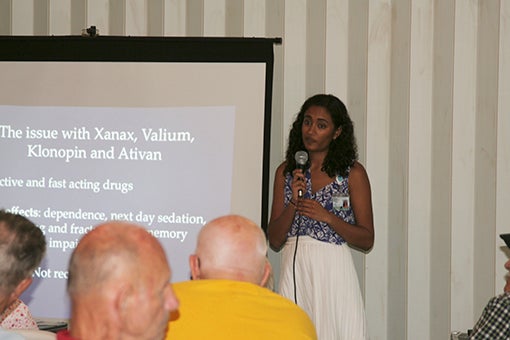Seniors get tips on better sleeping
Published 7:00 am Thursday, October 1, 2015

SHARING KNOWLEDGE: Medical student Aditi Dasgupta gives a presentation about the four keys to a more restful sleep at the Senior Center of South Pearl River County on Wednesday. Photo by Ashley Collins.
Wednesday, community members visited the Senior Center of South Pearl River County to learn about how to get a good night’s sleep.
The guest speaker was Aditi Dasgupta, a third-year medical student at the Tulane University School of Medicine. Dasgupta is currently interning for six weeks with Dr. Delora Denney at the Picayune Family Care Center.
“During this program, I came up with a project that helps Dr. Denney address an issue with her patient population. We noticed many of her patients had issues with sleep, especially the elderly population,” Dasgupta said.
After conducting research on sleep, Dasgupta compiled her research to create the four keys to more restful sleep, highlighting the factors necessary to achieve a good night’s rest. The four keys include, sleep hygiene, stimulus control, sleep restriction and sleep aids.
People of all ages can start improving their long-term health by building better sleeping habits, Dasgupta said. It’s important for people to practice proper sleep hygiene, which includes avoiding caffeine during lunch, waking up and going to sleep at the same time every day and avoiding the use of electronics before bedtime.
Dasgupta said people have the power to control their sleep time in order to ensure they wake up well-rested the next morning.
“Try to fall asleep between 15 to 20 minutes. If you can’t, get out of bed and do another activity that will help you get sleepy and then go back to bed and try again,” Dasgupta said.
While it seems counterproductive, people should restrict their sleep time in order to break their negative sleep habit cycle. People can achieve a good night’s rest by using a sleep log to monitor the average hours of sleep they receive each night for two weeks. During this time, people should sleep the same number of hours each day, avoid taking daytime naps and increase daily physical activity to avoid fatigue, Dasgupta said.
“After those two weeks, you’ll be so tired that you’ll sleep the entire night,” Dasgupta said.
She suggests adding 15 minutes of sleep every week thereafter in order to sleep well.
Sleep aids can also be utilized to remedy sleeping problems.
“Medicines are the most commonly used methods to treat sleep problems like insomnia. But in the long-term, medicines don’t improve sleep,” Dasgupta said.
While medicines like Ambien, Sonata and Valium may improve sleep issues in the short-term, several of those medications come with side effects. Dasgupta encourages people to discuss medication options with their doctor beforehand.
Darlene Adams, the center’s executive director, said those tips are beneficial for people of all ages.
“Seniors are finding that they’re having more difficulties sleeping and a lot of it has to do with their medications and stimulants from their television. This is something that all seniors and non-seniors need help with,” Adams said.



